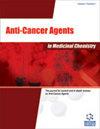姜黄素、生姜、丁香和苦杏仁的草药提取物对艾氏腹水癌挑战小鼠的抗肿瘤免疫和化疗预防作用
IF 2.6
4区 医学
Q3 CHEMISTRY, MEDICINAL
Anti-cancer agents in medicinal chemistry
Pub Date : 2024-04-16
DOI:10.2174/0118715206269038231203151111
引用次数: 0
摘要
背景由于其全身毒性,传统的肿瘤化疗正受到重视。草药疗法含有植物化学多酚衍生物,如姜黄素(Cur)、生姜(Gin)、丁香(Clov)和杏仁酸(Amyg),是抗癌疗法的众多补充和替代方法之一,在癌症化疗预防方面前景广阔,副作用较小。研究目的本研究旨在评估莪术、生姜、姜黄和艾米格的草药提取物对艾氏腹水癌(EAC)小鼠的抗肿瘤免疫力以及抗癌和化疗预防效果。方法通过流式细胞术检测 EAC 肿瘤细胞的凋亡率,分析了 Cur、Gin、Clov 和 Amyg 中草药提取物的体内化疗预防功效。此外,还研究了 EAC 挑战小鼠外周血(PB)中 EAC 细胞总数、脾脏细胞计数和白细胞计数及其差值相对百分比。结果与单用 PBS 治疗的 EAC 小鼠相比,用 Cur、Gin、Clov 和 Amyg 的草药提取物治疗的 EAC 小鼠的 EAC 肿瘤细胞数量明显减少,EAC 肿瘤细胞的凋亡率明显增加,血清中癌抗原 125(CA-125)的水平显著下降,脾脏细胞数量明显增加。此外,数据还显示,在接受 Cur 和 Amyg 治疗的 EAC 挑食小鼠中,白细胞总数及其相对于嗜酸性粒细胞、中性粒细胞、单核细胞和淋巴细胞百分比的差异变化不明显,但在注射 Gin 和 Clov 的 EAC 挑食小鼠中,这些参数与单独接受 PBS 治疗的 EAC 挑食小鼠相比明显增加。结论总之,Cur、Gin、Clov 和 Amyg 的中草药提取物可能具有抗肿瘤免疫和抗癌功效,并有可能降低癌症常规化疗的耐药性,以较低的不良反应发挥癌症化疗保护作用。有必要开展进一步研究,以确定该疗法对不同组织和器官的毒性,并将该疗法的生物医学用途与诊断和治疗方法联系起来。本文章由计算机程序翻译,如有差异,请以英文原文为准。
Anti-tumoral Immunity and Chemo-preventive Effectiveness of Herbal Extracts of Curcumin, Ginger, Clove and Amygdaline in Ehrlich Ascites Carcinoma-Challenging Mice
Background:: Due to its systemic toxicity, traditional chemotherapy of tumors is being taken into consideration. Herbal therapy, containing phytochemical polyphenol derivatives such as Curcumin (Cur), Ginger (Gin), Cloves (Clov) and Amygdaline (Amyg), is one of the numerous complementary and alternative approaches as an anti-cancer therapy and holds great promise for cancer chemo-prevention with fewer side effects. Aim:: The current study was designated to assess anti-tumoral immunity and anti-cancer and chemo-preventive effectiveness of herbal extracts of Cur, Ginger, Clov and Amyg in Ehrlich Ascites Carcinoma (EAC)-challenging mice. Methods: Chemo-preventive efficacy of herbal extracts of Cur, Gin, Clov and Amyg were analyzed in vivo by examination of the apoptosis rate of EAC tumor cells by flow cytometry. The total numbers of EAC cells, splenocytes counts and leucocytes count with their differentials relative % in peripheral blood (PB) of EACchallenging mice were investigated. Results:: EAC-challenging mice treated with herbal extracts of Cur, Gin, Clov and Amyg showed a marked decline in EAC tumor cell count and a noticeable increase in apoptosis rate of EAC tumor cells, a remarkable decrease in serum level of cancer antigen 125 (CA-125) with an obvious increase in the number of splenocytes comparing to that in EAC-challenging mice treated with PBS alone. Moreover, the data indicated an insignificant change in the total leucocytes count and their differentials relative % of eosinophil, neutrophils, monocytes and lymphocytes in EAC-challenging mice treated with Cur and Amyg, but these parameters were markedly increased in EAC-challenging mice injected with Gin and Clov compared to that in EAC-challenging mice treated with PBS alone. Conclusion:: To conclude, the herbal extracts of Cur, Gin, Clov and Amyg may have anti-tumoral immunity and anti-cancer potency and potential to reduce the resistance to cancer conventional chemotherapy and exert cancer chemo-protective approaches with low adverse effects. Further research is necessary to determine the regimen's toxicity on various tissues and organs and to connect the diagnostic and therapeutic approaches used in the regimen's biomedical use.
求助全文
通过发布文献求助,成功后即可免费获取论文全文。
去求助
来源期刊

Anti-cancer agents in medicinal chemistry
ONCOLOGY-CHEMISTRY, MEDICINAL
CiteScore
5.10
自引率
3.60%
发文量
323
审稿时长
4-8 weeks
期刊介绍:
Formerly: Current Medicinal Chemistry - Anti-Cancer Agents.
Anti-Cancer Agents in Medicinal Chemistry aims to cover all the latest and outstanding developments in medicinal chemistry and rational drug design for the discovery of anti-cancer agents.
Each issue contains a series of timely in-depth reviews and guest edited issues written by leaders in the field covering a range of current topics in cancer medicinal chemistry. The journal only considers high quality research papers for publication.
Anti-Cancer Agents in Medicinal Chemistry is an essential journal for every medicinal chemist who wishes to be kept informed and up-to-date with the latest and most important developments in cancer drug discovery.
 求助内容:
求助内容: 应助结果提醒方式:
应助结果提醒方式:


